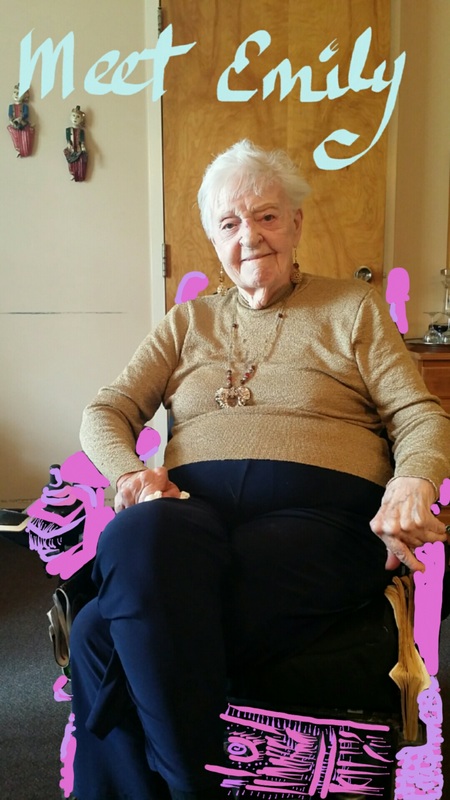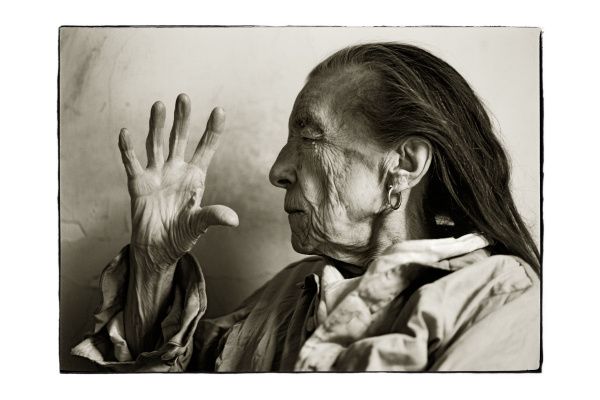|
Meeting with Emily
From the first impromptu meeting I had with Emily it was obvious she had a great personality and much to talk about. Learning she was born in 1921, making her 95 years young and born in England. Yes, she was wheel chair bound with arthritic hands but her bright intelligent eyes connected with you in such a profound way. The words poured out of her as she spoke of her marriage and the role she filled as a housewife turned teacher after her husband died. She loved the obligatory position she was in and had no qualms with raising her daughter and son. She believes in the tradition of marriage but understands the shifting of values in the 21st century. Her idea of marriage comes from the steadfastness of devotion. April 24,2016 Part 1 Emily Lloyd Interviewer:What does the meaning of life mean to you now and what it mean to you in your twenties? Emily: “ Oh its great!. In my twenties I was going through a war. We didn’t know if whether any of the boys that we were in school with would come back. And of course they didn’t come back. Some came back badly hurt. Your ideas of what you wanted to do for life were completely changed because you had to do war work. I was hoping to be an opera singer. That’s what I wanted to be and I ended up gong to teachers college because that is what the thing they were wanting at the time and I couldn’t get to London for my music. Now … Well I can’t walk. But I have an electric chair. I have a daughter living in Toronto who has a doctorate of Divinity. She did have a church but now she belongs on an executive of the United church. She spends a lot of time away from here. She has been in Israel, Kenya and all over. One son in Sydney, Australia . That’s my family. I’ve accepted the fact that I can’t get out of here. Except with my wheel chair. I see my daughter every three weeks. I can’t say every three weeks .. It might be once a month. Basically I was a member of Saint Marks church . Anglican Church but I found out that all your associates that were there once you come to a place like this. You never see them. Only very occasionally. But that’s not a thing that you think about. I have relatives, well … not relatives really. I have a few second or third cousins in England and friends in England that I keep in touch with by telephone. Other than that I enjoy books and reading and , yes ,I think life is great as far as life is concerned. I could feel sorry for myself but I don’t. I kind of think Thank God I can read . My eyes don’t work together but at least they can work together so I can read. I’ve used glasses all my life and all of a sudden I don’t need to use glasses. Interviewer: What allows you to be positive in your life instead of being cynical or negative. ? Emily: What’s the point in being negative. What’s the point in being that. You only get stressful, you get miserable. While you are here, you weren’t sent to to earth to be miserable. You were sent to love. This is just a small section from the recorded audio I have of Emily. The audio needs to be edited and I am having technical difficulties but once it has been completed I will post the interview.
0 Comments
Over the 1.5 million years of human existence, it is only for about the past 200 years that most people have gone to anyone other than local elders for solutions to life’s problems. Anthropologists tell us that in prehistoric times, the accumulated wisdom of older people was a key to human survival. Not only did the old (and especially grandmothers) improve the survival chances of their grandchildren by caring for them and finding them food; they also were the source of tried and tested experience, the true “elders” to whom group members would go in time of crisis.
Karl A Pillemer, Ph.D. This statement stuck with me as I began research for this project. Elders in our community are easily forgotten. I saw this with my own grandmother in the last years of her life. Seniors come from a different time and speed which can be exhausting but what you can gain is a vast knowledge of history and family history. To expand more on the reason for Wise Words, I began this project a few years ago when I was meeting with my own Oma every week for an hour or two and tried to get as much history from her as I could. I learned life stories that most had never heard, her experience in living through WWII, the advanced medical system in Holland due to my Oma being born blind but through surgery was able to see in her 9th year. Through her life story I learned valuable lessons from her and even asked her for advice in my life. She was very opinionated about a man that I had mentioned to her and I still to this day will smile and realize her wisdom. The purpose of this project is to share my creative talents and journalist interest in producing something we can all connect with. I feel privileged to record a persons life history, wisdom, advice and how they could impact the years to come for you from their wisdom in their lives lived. Art is not about art. Art is about life, and that sums it up. Louise Bourgeois has been an inspiration for me since learning about her work in first year of art school. She is a strong willed women with intense work about her childhood and her relationship with her father. She aged with grace and passion not allowing aging to stand in her way.
The Wise Words project started out with my own grandmother. My Oma a very strong willed woman herself showed her true colors near the end of her life. The stories she told about her life as a nurse and in Holland during WWII were ones I wish I had on record. Her way of speaking with her thick Dutch accent with her bottle-cap glasses. The images she created in my mind with her story allowed me to create this project to continue her legacy. Wise Words is in the beginning stages but I invite you to follow the journey. I will be posting write-ups, images and audio of interviews I have with seniors. I want to share their stories of wisdom, ideas on how they trudged through this life and aging gracefully. |
AuthorArt is my way to connect with this world. ArchivesCategories |


 RSS Feed
RSS Feed
